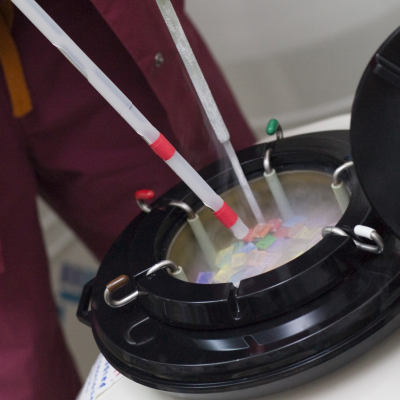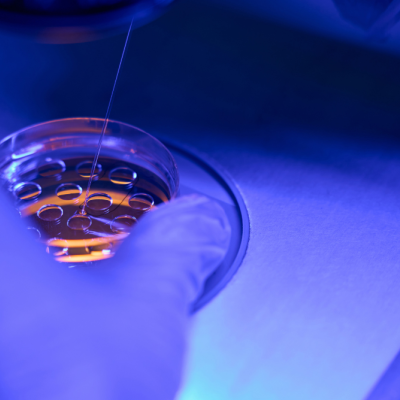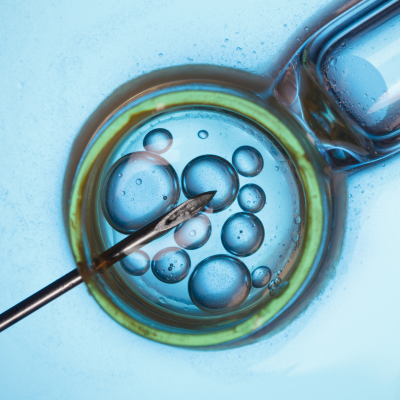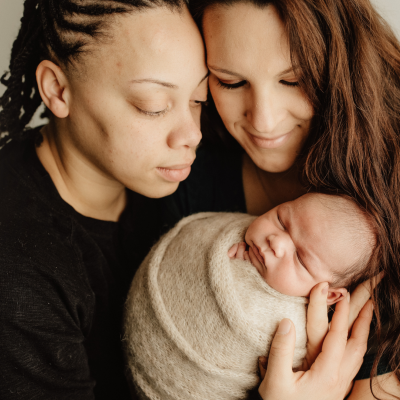IVF Failure
What to do after IVF failure?
The In vitro fertilization process can be emotionally, physically, and mentally exhausting. You finally take the plunge and make the decision to pursue IVF to build your family, and then these incredible embryos you make don’t implant after the transfer. A failed embryo transfer can be devastating.
Recurrent implantation failure (often defined as failure to achieve a clinical pregnancy after two or more embryo transfers of morphologically good embryos) is estimated to affect approximately 10% of women seeking IVF treatment.
At CCRH we recognize the frustration and disappointment with failed embryo transfers. We are constantly reviewing the most up to date technology and validated diagnostic testing that can improve your chances of a successful transfer.
We will review some of them in this article.
Diagnostic tests for failed embryo transfer
ERA (Endometrial Receptivity Analysis)
What does the ERA test look for?
The preparation of the uterine lining is crucial for implantation to occur. While preparation with estrogen and progesterone is the gold standard, every woman has a specific window of implantation (where the lining is receptive or “sticky” to an embryo trying to implant). About 3 in 10 women have a displaced window of implantation. This adjustment in progesterone timing can make all the difference in having a successful transfer.
Who should undergo ERA testing?
We offer patients who have had two failed embryo transfers of morphologically good embryos, or a single failed transfer with a euploid embryo the option of pursuing ERA testing. There is some data that show the pregnancy rate using ERA even with the first IVF cycle can result in a higher pregnancy rate.
How does ERA work?
After a consultation with Dr. Mor or Dr. Woo, if we believe you are a good candidate for additional ERA testing we will start a mock transfer cycle. You will be started on estrogen and progesterone preparation based on the standard protocol, and instead of an embryo transfer, on that day we perform a uterine biopsy in the clinic. The result will show that the lining is receptive ( the transfer is occurring during the window of implantation) or non- receptive (your window of implantation is displaced). If you have a non-receptive result that will guide us to adjust and personalize your embryo transfer.
ReceptivaDx
What does ReceptivaDx look for?
ReceptivaDx is a test that detects inflammation of the uterine lining most commonly associated with endometriosis, one of the leading causes of infertility and failed implantation.
Who should undergo ReceptivaDx testing?
Women with unexplained infertility with previous failed embryo transfers of high quality embryos should consider ReceptivaDx testing.
Women testing positive for ReceptivaDx ( BCL6) are 5 times less likely to succeed in IVF than women testing negative.
How does ReceptivaDx work?
Similar to the ERA, the ReceptivaDx can be done during a mock cycle with an in clinic uterine biopsy or it can be timed to your natural cycle.
What happens if I am positive for ReceptivaDx?
If found to be positive for BCL6, endometriosis is likely. A treatment plan involving hormone therapy or laparoscopy to remove visible endometriosis can correct the situation. Dr. Mor and Dr. Woo will walk you through the risks and benefits of both and help you choose the best treatment option.
Endometritis
Endometritis is an inflammatory condition of the lining of the uterus. Endometritis is generally caused by infections, sexually transmitted infections such as chlamydia and gonorrhea may cause it but so can the normal mixture of vaginal bacteria.
While some women may have abnormal vaginal discharge, or vaginal bleeding, others may have no symptoms. Inflammation in the uterine lining though can lead to infertility and failed embryo transfer.
Who should be evaluated for endometritis?
Women with unexplained infertility with previous failed transfers of high quality embryos should consider endometritis testing. Women with history of pelvic infections, surgical procedures of the uterus, or recent miscarriage may also benefit from testing.
How does Endometritis testing work?
Biopsy for endometritis can be done in the clinic as part of a mock cycle or timed to your natural cycle.
The pathologist will evaluate the biopsied tissue for any inflammatory cells (plasma cells) that are a sign of infection.
What happens if I do have endometritis?
Treatment for endometritis is a course of antibiotics. Rebiopsy of the lining to show a test of cure (endometritis is resolved) is important prior to proceeding with the next transfer. There is convincing data that shows a higher chance of a successful transfer after endometritis has been cleared.
Dr. Mor and Dr. Woo are prepared to provide a second opinion for you if you have suffered multiple IVF failure. After a thorough evaluation of your individual situation, we may advise additional testing and treatment options to help you have the best chance at success.
References:
*Simón et al., In vitro fertilization with personalized blastocyst transfer versus frozen or fresh blastocyst transfer: a multicenter, randomized clinical trial. Fertility and Sterility, 2019; 112. e56-e57. 10.1016/j.fertnstert.2019.07.273.**Oral presentation, Clemente-Císcar, ESRHE 2018
Likes CE et al. Medical or surgical treatment before embryo transfer improves outcomes in women with abnormal endometrial BCL6expression. J of Assist Reprod and Genetics, 2019; 36. 483-490.
Don’t just take our word for it!
Listen to what our patients have to say.

3,000+

20+

2X
FAQ
Reproductive endocrinology and Infertility is a sub-specialty of Obstetrics and Gynecology. In addition to managing medical and surgical treatment of disorders of the female reproductive tract, reproductive endocrinologist and infertility (REI) specialists undergo additional years of training to provide fertility treatments using assisted reproductive technology (ART) such as in vitro fertilization.
Reproductive endocrinologists receive board certification by the American Board of Obstetrics and Gynecology in both Obstetrics and Gynecology and Reproductive Endocrinology and Infertility.
In general, patients should consider consulting with an REI specialist after one year of trying unsuccessfully to achieve pregnancy. The chance of conceiving every month is around 20%, therefore after a full year of trying approximately 15% of couples will still not have achieved a pregnancy.
However, if a woman is over the age of 35 it would be reasonable to see a fertility specialist earlier, typically after 6 months of trying.
Other candidates to seek earlier treatment are women who have irregular menses, endometriosis, fibroids, polycystic ovary syndrome (PCOS), women who have had 2 or more miscarriages, or problems with the fallopian tubes (prior ectopic pregnancy).
Approximately 1/3 of the time cause for infertility is a female factor, 1/3 of the time a male factor, and the remaining 1/3 a couples’ factor.
At CCRH, we emphasize the importance of establishing a correct diagnosis. Both partners undergo a comprehensive evaluation including a medical history and physical exam.
Furthremore, the woman’s ovarian reserve is assessed with a pelvic ultrasound and a hormonal profile. A hysterosalpingogram (HSG) will confirm fallopian tube patency and the uterine cavity is free of intracavitary lesions. A semen analysis is also obtained to evaluate for concentration, motility, and morphology of the sperm.
Additional work up is then individualized to direct the best possible treatment option for each couple.
In vitro fertilization (IVF) is the process that involves fertilization of an egg outside of a woman’s body.
The process starts with fertility drugs prescribed to help stimulate egg development. In your natural cycle, your body is only able to grow one dominant egg, but with stimulation medication we can recruit multiple eggs to continue to grow. After about 8-10 days of stimulation, the eggs are surgically retrieved and then fertilized with sperm in a specialized laboratory. Fertilized eggs are then cultured under a strictly controlled environment within specialized incubators in the IVF laboratory for 3-5 days while they develop as embryos. Finally, embryos (or an embryo) are transferred into the uterine cavity for implantation.
Before deciding if IVF is the right choice, it’s important to sit down with an REI specialist to discuss available treatment options. For some people, other methods such as fertility drugs, intrauterine insemination (IUI) may be the best first choice treatment. At CCRH, we believe each individual couple is unique and not everyone needs IVF.
While not painful, the fertility medications may some side effects including headaches, hot flashes, mood swings, and bloating. The injection sites may also bruise.
Unfortunately, no. Many people think once they start IVF it’s a matter of time that they will be pregnant and have a baby. But according to national statistics per the Society of Assisted Reproduction (SART), on average 40% of assisted reproduction cycles achieve live births in women under age 35. The chances of success then continue to decrease with advancing age.
At CCRH, we employ only evidence-based interventions to ensure patient safety and optimal outcome. While we cannot guarantee a baby, we guarantee that you will receive the best, most advanced, personalized care to help you maximize your chance of a baby.
The average IVF success rate (success measured in live birth rate) using one’s own eggs begins to drop around age 35 and then rapidly after age 40. This is due to the decline in egg quantity and egg quality as a woman ages.
Our clinic’s success rate consistently beats the national average year after year.
Individual insurance plans often do not have any coverage for infertility treatments. If you have a group plan, you can call members services to see if they have coverage for infertility (including consultation/workup and IVF).
After your consultation with our REI specialist, one of our dedicated account managers with sit with you to go over the cost of treatment.
















